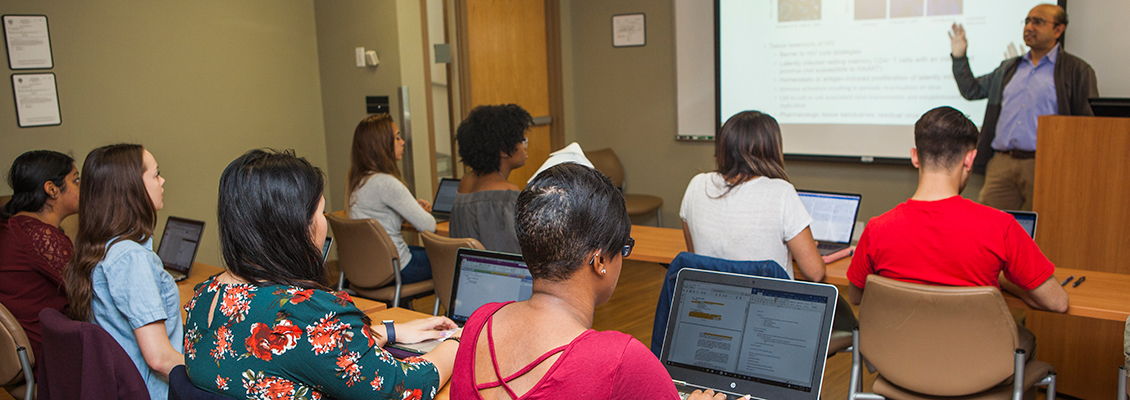Masters Curriculum

Students must complete at least 28 course credits and at least 4 research credits for a total of at least 32 credits. This includes the following courses:
Nutrition Required Courses:
GMS NU 755: Molecular, Biochemical and Physiologic Bases of Nutrition I: Energy Balance and Micronutrients
4 credits
This is one course in a 2-semester sequence (that can be taken in either order) focusing on the physiological, biochemical and molecular bases of nutrition. This semester covers concepts of essential nutrients and methods for determining their requirements (DRIs), body composition, nutrition and growth, energy expenditure and regulation of energy intake, macromineral metabolism (including Ca, P), and micronutrients. Functions and roles of micronutrients in signaling from gene to the whole organism will be discussed. Nutrient requirements through the lifecycle and in health and disease will be addressed. The course includes discussion sessions that will teach students to critically evaluate cutting-edge and seminal papers addressing each topic and will introduce students to state of the art research approaches and methodologies from cellular and molecular to clinical and epidemiologic. Writing assignments will provide experience and hone skills with scientific writing.
GMS NU 709: Research Design and Statistical Methods for Biomedical Sciences
3 credits
The overall objective of this course is to provide students with an understanding of basic concepts of research design and data analysis in the biomedical sciences. The primary didactic areas to be covered include framing hypotheses and objectives, the use of experimental designs and, to a lesser degree, non-experimental designs, and inferential statistical analyses. Weekly topics will include problems assessment of of differential and non- differential error (including bias and confounding), foundational principles of data description (including measures of central tendency and dispersion), the use and limitations of statistical testing, as well as and analysis (of independent andvs. correlated data, , parametric and vs. non-parametric data distributions, measures of central tendency and dispersion), effect estimation, the use and limitations of statistical testing, including univariable and multivariable modeling, and microarray analysis. All students will be required to learn a statistical programming language (e.g., SAS). The course employs both didactic sessions and in-class exercises.
GMS NU 756: Molecular, Biochemical and Physiologic Bases of Nutrition II: Macronutrients
4 credits
Regulation of lipid, carbohydrate, and protein digestion, absorption, transport, tissue and cellular metabolism. Integration of macronutrient metabolism in response to alteration in nutritional status (e.g. starvation, obesity) on a whole body and tissue-specific basis. Mechanism regulating macronutrient metabolism in response to stresses such as exercise and aging and disease. A discussion session will teach students to critically evaluate research papers, provide knowledge of seminal papers in the field, and introduce students to research approaches and state of the art methods (e.g. assessment of metabolic flux using stable isotopes, euglycemic clamps, metabolomics).
GMS NU 620: Clinical Nutrition Research
3 credits
The course will focus on disease states related to nutrition and diet, with a major focus on clinical nutrition research. The course goals are as follows: (1) acquaint students with current concepts and methods in clinical nutrition research, (2) familiarize students with clinical research and how investigators approach nutrition-related questions in their specific fields to answer questions related to disease states, (3) evaluate the role of nutrition as it relates to development, prevention and therapy of major diseases, including cardiovascular disease, diabetes, gastrointestinal disorders, osteoporosis, obesity, and cancer.
GMS NU 700: Nutrition and Metabolism Seminar
3 credits
Students learn the principles of presenting an effective scientific talk, including the use of PowerPoint to create appropriate and effective slides. In consultation with course faculty, each student selects a topic and two related key papers and then develops three presentations over the course of the semester within the class. Using feedback provided after each practice talk, students present their final public research seminar talk at the end of the semester. The course also expands knowledge of various topics in nutrition and metabolism.
GMS NU 901/2: Nutrition and Metabolism Research (Thesis)
4 credits
This course number is used during the period of your thesis research. The NU 901 course code is for research taking place during the fall semester when students are in the laboratory or another research unit carrying out research for their master’s thesis or doctoral dissertation. The NU 902 course code is for research taking place during the spring semester.
Nutrition Elective Courses:
GMS NU 711: Physical Activity and Metabolism
2 credits
This course explores the evidence relating exercise and physical inactivity to heart disease, dementia, cancer, conditions of aging, and other chronic health conditions including obesity and diabetes. Weekly discussion sessions will teach students to critically evaluate cutting-edge and seminal papers in the field and introduce students to state of the art research approaches and methodologies, including both basic (cell and molecular) and translational perspectives. Writing assignments on the papers will provide experience and hone skills with scientific writing.
OTHER ELECTIVES
Elective courses may be chosen from programs throughout GMS.
One elective course may be taken from other programs at Boston University such as the School of Public Health.
Boston University is also a part of the Boston Area Consortia which allows BU students to take courses at other Boston-area colleges and universities.
